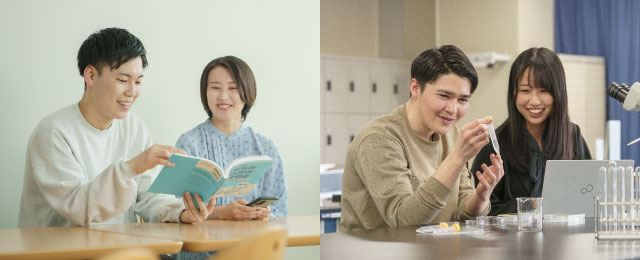







Home > Admissions > Admission Policy > Faculty of Medicine
The Faculty of Medicine has two departments: the Department of Medicine and the Department of Nursing. Graduates from the Faculty are playing leading parts in the front line of community medicine, at various medical institutions in Japan and abroad and at research facilities throughout the world.
The Department of Medicine was established in 1973 as one of the first medical schools to be set up under a national plan to have at least one medical school in each prefecture to play the core role in community medicine. Since its foundation, the Department has produced 3,653 graduates under its philosophy of "ostering doctors and medical researchers equipped with a broad view who can learn, think and create things and develop them further throughout their lives."
The Department of Nursing was set up in 1993 as the first four-year national nursing college in the Tohoku northeastern Japan and Hokkaido regions. It has been raising nursing professionals with knowledge and skills to meet the demands of the times as well as rich humanity. The Department has turned out 1,190 medical people and professional researchers.
While making incessant efforts to raise the level of medical care as the core facility of community medicine, the Faculty of Medicine educates students to acquire cutting-edge knowledge and skills in their respective specialty fields, heighten their awareness as medical professionals and assume a befitting attitude. Its goal is to develop doctors and nursing professionals who can continue improving these qualities throughout their lives.
The Department of Medicine carries out exacting medical education based on a scrupulous curriculum under the philosophy of "fostering thinking doctors with a rich sense of humanity."
The curriculum reflecting remarkable progress in advanced medical research, such as human genome analysis, allows students to gain cutting-edge medical knowledge. The curriculum is elaborately worked out for clinical medicine education designed to develop problem-solving doctors by setting achievable, realistic goals.
Many of the graduates of the Department of Medicine are engaged in medical activities as clinical doctors at medical facilities throughout the country. There are also many people who are active as scholars of basic medical sciences at universities and laboratories.
Under sister university arrangements with overseas universities, especially Chinese, the department conducts active exchange of students and researchers.
In addition to education, the department contributes to the community medicine through medical care at Yamagata University Hospital and other hospitals in the region, takes part in various international medical researches and conducts joint researches with the private sector.
On the basis of ethics respecting life and protecting human rights, the Department of Nursing conducts nursing education to raise sincere nurses, public health nurses and midwives with a rich sense of humanity.
In cooperation with people involved in public health, medicine and welfare, the department provides a curriculum designed to nurture people who can give evidence-based safe nursing care.
The basic philosophy is to develop nursing professionals who can change nursing roles, functions and duties as needed by being sensitive to changes in society and people's lives.
Many of the department's graduates are actively working at medical institutions throughout the country as nurses, public health nurses or midwives. Increasing graduates are also serving as researchers and educators at universities or working overseas.